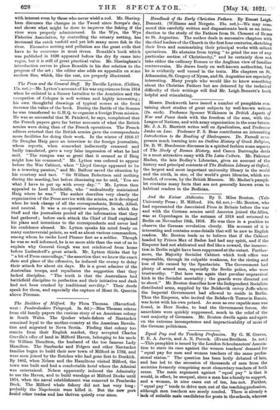The Press and the General Staff By Neville Lytton. (Collins.
15s. net.)—Mr. Lytton's account of his war experiences from 1914 when he enlisted in a Sussex battalion to the Armistice and the occupation of Cologne is well written and highly interesting ; his own thoughtful drawings of typical scenes at the front increase the value of the book. During the Battle of the Somme he was transferred to G.H.Q. to organize a foreign Press mission. He was so successful that M. Painleve, he says, complained that the French papers gave far better accounts of what the British armies were doing than of the French operations. The French editors retorted that the British armies gave the correspondents more facilities for doing their work. In the winter of 1916-17 Sir Douglas Haig gave an interview to the foreign journalists, whose reports, when somewhat indiscreetly censored and badly translated, gave a very false impression of what he had said. " The rumpus was so great that it seemed as if Haig might lose his command." Mr. Lytton was ordered to appear before the War Cabinet, when " Lloyd George appeared to be in a towering passion," and Mr. Balfour saved the situation by his courtesy and tact. " Sir William Robertson said nothing during the meeting, but before dismissing me he said, ' You see what I have to put up with every day.' " Mr. Lytton then appealed to Lord Northcliffe, who " undoubtedly maintained Haig where he was." The author describes very clearly the organization of the Press service with the armies, as it developed when he took charge of all the correspondents, British, Allied, and neutral. It was a co-operative enterprise, in which the Staff and the journalists pooled all the information that they had gathered ; before each attack the Chief of Staff explained his plans and intentions to the correspondents and never had his confidence abused. Mr. Lytton speaks his mind freely on many controversial points, as well as about various commanders, among whom he ranks Lord Plumer first as a soldier. Though he was so well informed, he is no more able than the rest of us to explain why General Gough was not reinforced from home before Ludendorff 's great attack. Mr. Lytton thinks that by " a bit of Press camouflage," the assertion that we knew the exact date and place of the offensive, he induced the enemy to delay their attack for about six days. He is a great admirer of the Australian troops, and repudiates the suggestion that they lacked discipline. " The truth is that the Australians had battlefield discipline to perfection and their initiative and dash had not been crushed by • traditional servility." Their deeds speak for them, and especially the capture of Mont St. Quentin above Peronne.


































 Previous page
Previous page